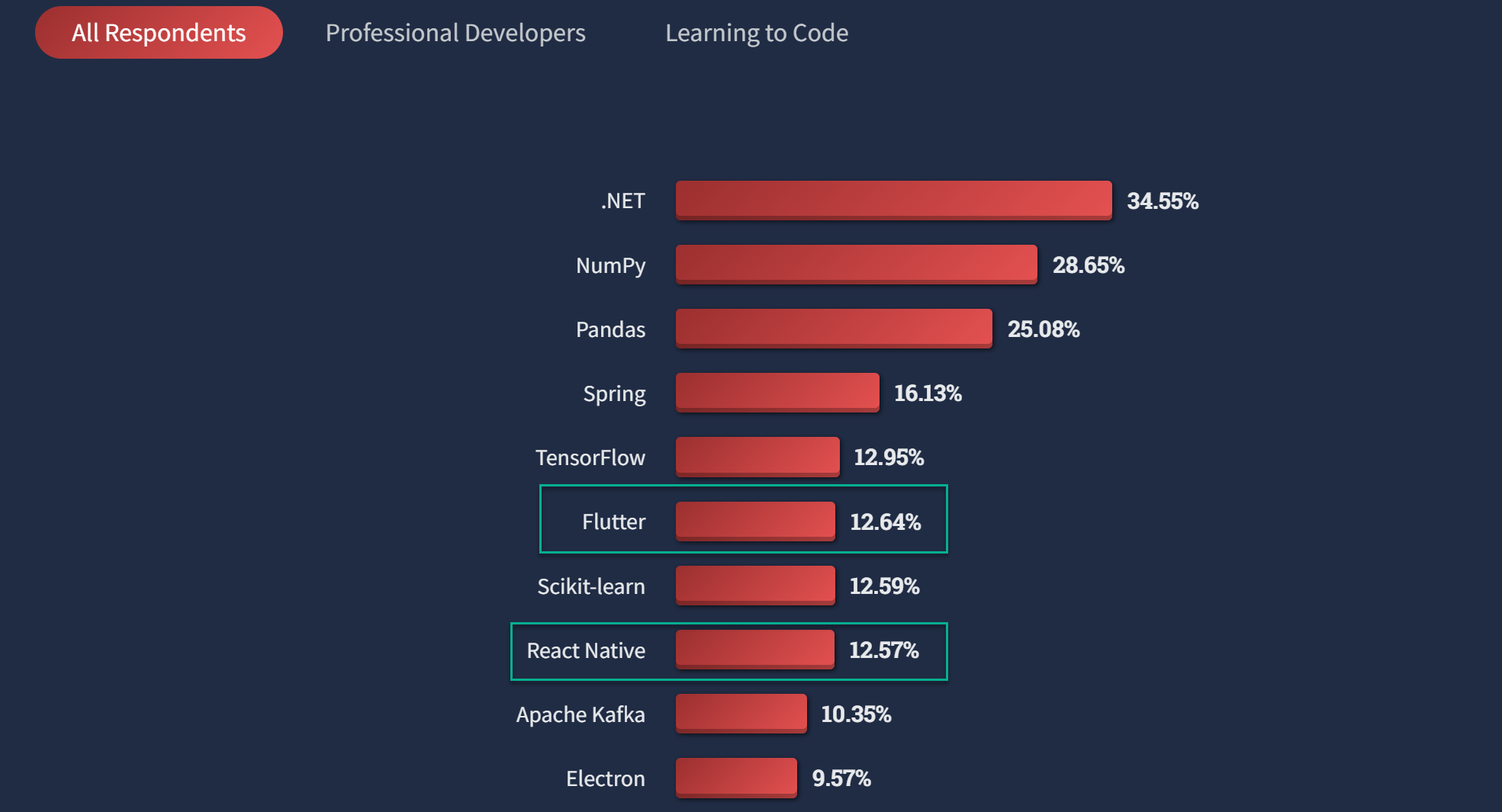SHARE
Popularity of Flutter vs. React Native in 2026

Contents
Contents
Introduction
Flutter and React Native are leading frameworks for building iOS and Android apps with a single codebase, offering performance comparable to native apps. Known for their slick user interfaces, both have robust communities, extensive documentation, and third-party support. While React Native integrates with React.js web applications for code reuse, Flutter’s recent updates enable desktop and web app development from the same codebase. The key difference lies in their UI development approach: React Native uses native UI components, whereas Flutter employs a unique canvas and widget-based UI framework.
Comparing Flutter and React Native reveals no clear winner in cross-platform mobile app development. While companies providing mobile app development services often utilize both, the question remains: which is more popular in 2024?
Google Trends Popularity Comparison
In internet searches, Flutter consistently outperforms React Native, nearly doubling its results over the past year. However, Google Trends’ bias towards newer technologies suggests that the community’s existing familiarity with React Native leads to fewer searches. Despite this, Flutter’s significant lead indicates growing interest and discussion around this technology. In the below chart:
- Flutter is Blue
- React Native is Red

Stack Overflow Popularity Comparison
As a major developer community, Stack Overflow provides valuable insights into technology engagement. Let’s explore Flutter and React Native’s presence on this platform.
Stack Overflow Developer Survey
The 2024 survey results are pending, but 2022 data reveals a close race in cross-platform app development popularity. For “All respondents,” Flutter slightly leads with 12.64%, closely followed by React Native at 12.57%. However, among professional developers, React Native leads with 13.62% compared to Flutter’s 12.56%. This data highlights the neck-and-neck competition between the two frameworks.

Stack Overflow Questions
A comparison of Stack Overflow questions shows Flutter leading with 160k queries, against React Native’s 130k. This metric suggests stronger community engagement with Flutter.

GitHub Popularity Comparison
GitHub, as the most popular development resource for code repositories, collaboration, and version control, offers insights into the popularity of Flutter and React Native. Let’s examine community engagement on GitHub for these frameworks.
GitHub Stars
As of April 22nd, 2023, Flutter has garnered over 152k stars, indicating a strong lead in popularity.

Popularity of Flutter on GitHub.
React Native, while trailing with 109k stars, remains a significant player in cross-platform development.

Popularity of React Native on GitHub.
GitHub Commits
Flutter shows a clear lead with 34,510 commits as of April 22nd, 2023, over 7k more commits than React Native’s 27,286.
GitHub Pull Requests
In terms of pull requests, React Native dominates with 300 requests, nearly double that of Flutter’s 171, indicating its status as the incumbent technology.
Programming Language
Choosing a framework for cross-platform mobile applications is influenced by the programming language’s popularity and familiarity. JavaScript, widely used in Node.js development, tilts the scale towards React Native. JavaScript is prevalent in 94.5% of websites, while Dart, the language behind Flutter, does not make the top 15 in the Stack Overflow 2022 survey. This disparity suggests that while Dart’s success is closely tied to Flutter, JavaScript has a broader impact beyond React Native.

Third-Party Libraries
The battle between Flutter and React Native also extends to third-party libraries. React Native, leveraging the JavaScript ecosystem, accesses over 1.8 million packages on NPM. In contrast, Dart/Flutter’s repository, pub.dev, offers around 33,000 packages. This disparity underlines React Native’s advantage in community support, although both frameworks typically provide solutions for app development challenges.
Available Expertise
Finding skilled developers for cross-platform apps is crucial. Job listings on platforms like Indeed, Glassdoor, and SimplyHired show significantly more opportunities for React Native developers, indicating a higher demand and availability of expertise in this area.

Flutter vs. React Native: Which is More Popular?
Defining ‘popularity’ can be subjective. In our Guide to Cross-Platform Mobile Development, we explore the popularity debate between React Native and Flutter. React Native’s widespread use, significant third-party library support, and the prevalence of JavaScript tilt the scale in its favor. However, Flutter’s dominance in Google search trends, GitHub stars, and community engagement on Stack Overflow suggest its rising popularity. Ultimately, Flutter, as the underdog, is a strong contender in the cross-platform framework race, potentially poised to reshape the market.

What is IT OT Convergence? Streamlining Operations for Efficiency
Flatirons Development
Oct 28, 2025
Secure Mobile App Development: Prioritizing Data Protection
Flatirons Development
Oct 22, 2025
What is Data Ingestion? Definition, Types, and Best Practices for Efficient Data Processing
Flatirons Development
Oct 16, 2025
Enterprise Computing: Transforming Business Operations
Flatirons Development
Oct 09, 2025
Explore the Top Embedded Systems Examples of Today
Flatirons Development
Oct 04, 2025
What is IT OT Convergence? Streamlining Operations for Efficiency
Flatirons Development
Oct 28, 2025
Secure Mobile App Development: Prioritizing Data Protection
Flatirons Development
Oct 22, 2025
What is Data Ingestion? Definition, Types, and Best Practices for Efficient Data Processing
Flatirons Development
Oct 16, 2025
What is IT OT Convergence? Streamlining Operations for Efficiency
Flatirons Development
Oct 28, 2025
Secure Mobile App Development: Prioritizing Data Protection
Flatirons Development
Oct 22, 2025
What is Data Ingestion? Definition, Types, and Best Practices for Efficient Data Processing
Flatirons Development
Oct 16, 2025
What is IT OT Convergence? Streamlining Operations for Efficiency
Flatirons Development
Oct 28, 2025
Secure Mobile App Development: Prioritizing Data Protection
Flatirons Development
Oct 22, 2025
What is Data Ingestion? Definition, Types, and Best Practices for Efficient Data Processing
Flatirons Development
Oct 16, 2025